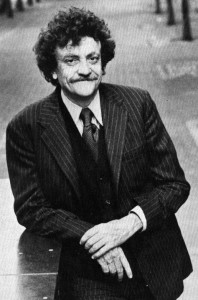On a day when I’m frisking about on my computer and getting lots of fine things done — none of which include me actually writing anything beyond overdue emails, which are not evil in and of themselves but do help me forget the Writing Plan (such as it was) for the day — I like to recall Professor King’s encouragement. This comes from his excellent book-length essay on the creative life, On Writing.
It’s Vonnegut Week, I guess. I’m re-reading Fates Worse Than Death, which has suddenly jumped the queue ahead of Bill McKibben’s Enough (readable, surprisingly funny for a grim assessment of our more is better! culture) and Seth Davis’s Wooden: A Coach’s Life (which I want to plough through uninterrupted). Given that Wooden and Vonnegut may be my top two American heroes — and hey, come to think, McKibben’s not a lot lower on that list — it’s not shocking that fiction is (again) on a lower shelf, not to mention the stack of magazines that arrived in our Ottawa mailbox during our last year in China. Woe is my reading list. (Reading lust.)
The following bit of KV is not from FWTD, or from Palm Sunday, its predecessor as a Vonnegut “autobiographical collage”. It’s from a more recent book called A Man Without a Country: A Memoir Of Life In George W Bush’s America — again, non-fiction, but even stronger in its searingly angry, despairing and somehow still spookily funny condemnation of the ruling elites in the U.S.A. (Canada currently has little, other than good luck, to boast about in this regard. Don’t get smug, Canucks.) This was among the happier quotes, one that gets cited again and again, and mostly out of context. I still like it out of context, and I print it below in this way because it contains one of KV’s goofy autograph/self-portraits.
A little context: the passage actually begins, ““If you want to really hurt your parents, and you don’t have the nerve to be gay, the least you can do is…” Adding that opening — which most quotation-hounds subtract, and now I’m among them — gives back the true bite of this shard of Vonnegutian advice.
This story, the story of this letter, has moved me over and over as if I was reading it for the first time. I might as well have been. Lately it has been on my mind constantly. This is likely because I have recently entertained the possibility that I will never haunt a classroom again, at least not for money. After years in between blackboards and bored kids, mainly in southern Ontario high schools but for five recent campaigns in two northeastern Chinese universities, I may be done with all that. Hence, the Kurt Vonnegut ear-worm, my writing hero‘s blazing honesty on repeat. (How did you do it, Kurt? How did you do it? I’m reading his non-fiction again, trying to find clues, but I mainly get beaten about the ears by the impossibility of doing what he did.)
Yes. So here’s the set-up. KV’s story is in the second of his “autobiographical collages”, Fates Worse Than Death. (The first was Palm Sunday, if you’re keeping score.) (Desert island books, both. I can read these things again and again.) He’s writing about his saintly “unicorn” of a father, and the stoic resilience he showed as an artist enduring commercial vulgarity and disdain, and as a man surviving the madness of his wife. Kurt Junior ends this whimsically sad tribute to a man living in the wrong era by telling of his own early days as a writer, maybe one born at the right time — if being a World War II infantryman is good timing.
At age 27, Vonnegut was paying bills by writing advertising copy for General Electric by day, but his eccentric short stories were — amazing as this seems in hindsight — being accepted by the mass-market general-interest magazines of the day. The last word on his beauty-loving Daddy was this:
“Art is the greatest game, the supreme entertainment, because you discover the game as you play it. There is only one rule…: Astonish us! In all art we look and listen for what we have not experienced quite that way before. We want to see, to feel, to understand, to respond a new way…”
Pauline Kael (1919-2001) was a notable American film critic who wrote for The New Yorker magazine for many years. She is the godmother of movie reviewing as an art form in itself.
[As with most of my “BRTN” reviews, a more concise version of this review will be published in an ex-patriate’s magazine in my Chinese city, Focus on Dalian. I can buy a pizza with my fee.]
I finished my third reading of a favourite guide – or was that four? – not long ago, and realized that I haven’t written about The War of Art much. (There are many scribblings and fluorescent highlightings in the pages of Steven Pressfield’s brief 2002 masterpiece on the struggle to be creative, and I have a seminar in mind, but this is my first sustained post, I think.) This is a book to be read and re-read, and is sometimes uncomfortably insistent on cutting through the crap and requiring a response from its reader. I hope you won’t avoid it on THAT account!
Pressfield might be best known for his first novel, The Legend of Bagger Vance (and the Will Smith movie that was based on it), but his main niche is historical fiction.

